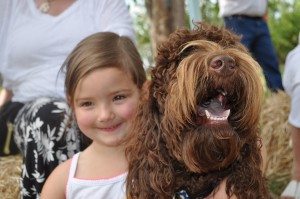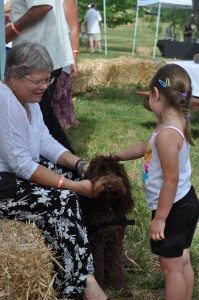 Max is a cancer therapy Labradoodle that meets and greets patients at the Marshall Medical Cancer Center in Cameron Park. His owner and the Cancer Resource Center director, Wendy Goossen, remembered one day in particular when a young girl approached her. She asked if Wendy was the woman in the For Your Health cover story about Max. Once that was settled, the little girl was so excited that she planned to accompany her grandmother during treatments, so she could also visit Max.
Max is a cancer therapy Labradoodle that meets and greets patients at the Marshall Medical Cancer Center in Cameron Park. His owner and the Cancer Resource Center director, Wendy Goossen, remembered one day in particular when a young girl approached her. She asked if Wendy was the woman in the For Your Health cover story about Max. Once that was settled, the little girl was so excited that she planned to accompany her grandmother during treatments, so she could also visit Max.
I recently met with Wendy Goossen to learn more about her vision for the Marshall Medical canine program, and what she hoped to achieve.
Q. How is the therapy program intended to work?
A. We have great clinics and clinicians at Marshall Medical Center, but I felt we were missing something in the healing arts. I thought pet therapy would be helpful in our patient care, and dogs are great. They provide affection and comfort, and have a way to help people open up and express themselves.
Q. How did you find and decide on Max?
A. I originally considered a lab, but realized that many people are allergic to animal fur. I researched hypoallergenic dogs, and found that Labradoodles do not shed. I found a great breeder in San Luis Obispo. I met with them and liked their approach to breeding, and the cleanliness of their facility. I also like their puppies, and the way they responded to me.
Q. What type of training does Max receive?
A. Max goes to Val’s K-9 training in Rescue. She’s wonderful with dogs and specializes in Labradoodles. The objective of the training is to socialize the dogs in all situations, so he’s never surprised or taken off guard. Max is doing well with his training.
 Q. What makes Max a good therapy dog other than being adorable?
Q. What makes Max a good therapy dog other than being adorable?
A. Max loves people, and likes to engage with everybody. Max recently attended a prostate support group, and he visited with each of the men individually. Veterans or kids, Max leaves everyone talking and smiling.
Q. What might I be surprised to know about Max?
A. Just because Max is part poodle doesn’t make him overly sensitive. Max loves his ball and the water. We recently went on vacation, and he loved the outdoors. Labs and poodles typically like water, so he’s a natural water lover.
Wendy says Max allows for conversation that would not happen otherwise. Whether it’s a granddaughter accompany her grandmother to an appointment, or meeting with a WWII Veteran, Max gets people to talk and to smile during serious health issues. This has to have a positive effect on reducing stress, promoting well-being and the treatment process.
I’m impressed and look forward to hearing more about the development of this awesome canine companion program.
The Marshall Medical K-9 Companion Program is possible because of a generous grant from Wells Fargo Bank.
If you’d like to be support pet therapy in your community, send your donation to: Max Fund/Marshall Foundation, P.O. Box 1996, Placerville, CA 95667